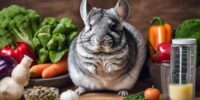How to Support Ferret Digestive Health With Dietary Additions
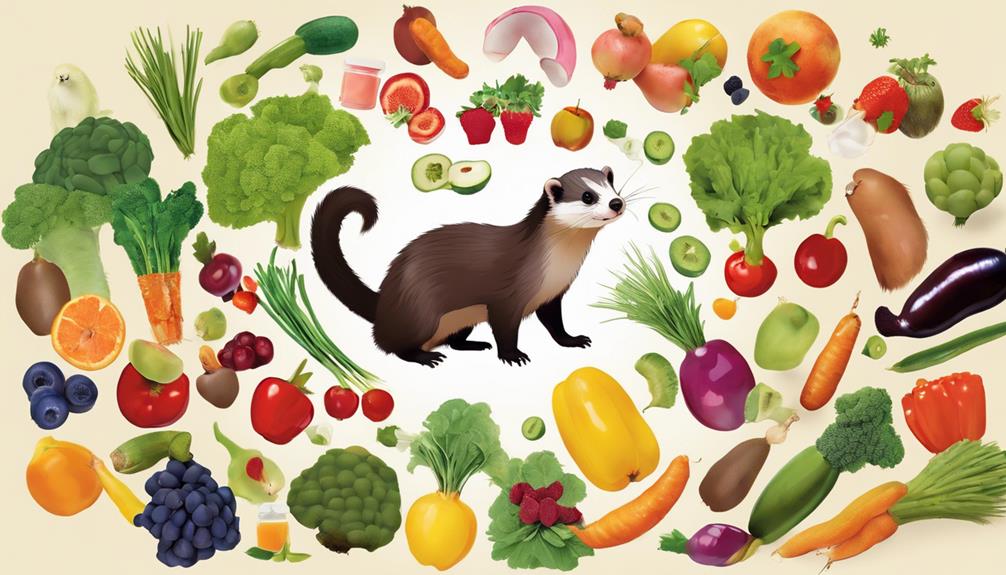
Ferrets have sensitive digestive systems that require special care to maintain their health. One way to support their digestive health is by including dietary additions such as probiotics. Probiotics can help maintain a healthy balance of good bacteria in the gut, which is essential for proper digestion. Additionally, including prebiotics in their diet can also be beneficial. Prebiotics are non-digestible fibers that help feed the good bacteria in the gut, promoting a healthy digestive system. Another dietary addition to consider is digestive enzymes, which can aid in the breakdown and absorption of nutrients from their food. By incorporating these dietary additions into your ferret's diet, you can help support their digestive health and overall well-being.
It's important to consult with a veterinarian before making any significant changes to your ferret's diet. In some cases, they may recommend specific dietary additions based on your ferret's individual needs and health status. With the right care and attention to their digestive health, you can help ensure that your ferret stays happy and healthy for years to come.
Importance of Ferret Digestive Health
Ensuring optimal digestive health in ferrets is crucial for their overall well-being and vitality. Ferrets have a short digestive tract designed for a diet high in protein and fat, making their digestive system sensitive to imbalances. Digestive enzymes play a critical role in breaking down food into nutrients that can be absorbed by the body. Without adequate digestive enzymes, ferrets may experience difficulties in digesting their food, leading to malabsorption and nutritional deficiencies.
Another essential aspect of ferret digestive health is maintaining a healthy gut flora. Gut flora, or the community of microorganisms living in the digestive tract, aids in digestion, synthesizes certain vitamins, and supports the immune system. Disruptions in gut flora balance can result in gastrointestinal issues and impact overall health. Therefore, incorporating dietary additions that promote the growth of beneficial bacteria in the gut can help support optimal digestive health in ferrets.
Probiotics for Gut Health

Promoting a healthy gut flora in ferrets through the use of probiotics can significantly enhance digestive health and overall well-being. The gut microbiome of ferrets plays a crucial role in nutrient absorption, immune function, and protection against harmful pathogens.
Here are three key benefits of incorporating probiotics into a ferret's diet:
- Balancing Digestive Flora: Probiotics help maintain a healthy balance of beneficial bacteria in the gut, which is essential for proper digestion and absorption of nutrients.
- Boosting Immune Function: By supporting a diverse and robust gut microbiome, probiotics can enhance the ferret's immune system, helping them fight off infections and diseases more effectively.
- Preventing Digestive Issues: Introducing probiotics can aid in reducing the risk of gastrointestinal disturbances like diarrhea and constipation, promoting overall gastrointestinal health in ferrets.
Incorporating probiotics into a ferret's diet can be a valuable strategy for supporting their gut health and overall well-being.
Fiber-Rich Foods for Digestion

To optimize ferret digestive health, incorporating fiber-rich foods into their diet is essential for promoting proper digestion and overall gastrointestinal function. High fiber treats can be a beneficial addition to a ferret's diet. Fiber helps regulate the digestive system by adding bulk to the stool, aiding in proper bowel movements, and preventing constipation. It also supports the growth of beneficial gut bacteria, which is crucial for overall digestive health. Additionally, fiber-rich foods can help prevent hairballs, a common issue in ferrets due to their grooming habits.
| High Fiber Treats | Benefits |
|---|---|
| Pumpkin | Aids in digestion and prevents hairballs |
| Green peas | Good source of fiber and essential nutrients |
| Carrots | Rich in fiber, vitamins, and minerals |
| Blueberries | Fiber-rich and packed with antioxidants |
Incorporating digestive enzymes along with high fiber treats can further enhance the digestive process in ferrets. These enzymes help break down food more efficiently, ensuring optimal nutrient absorption and reducing digestive issues.
Essential Nutrients for Digestive Support
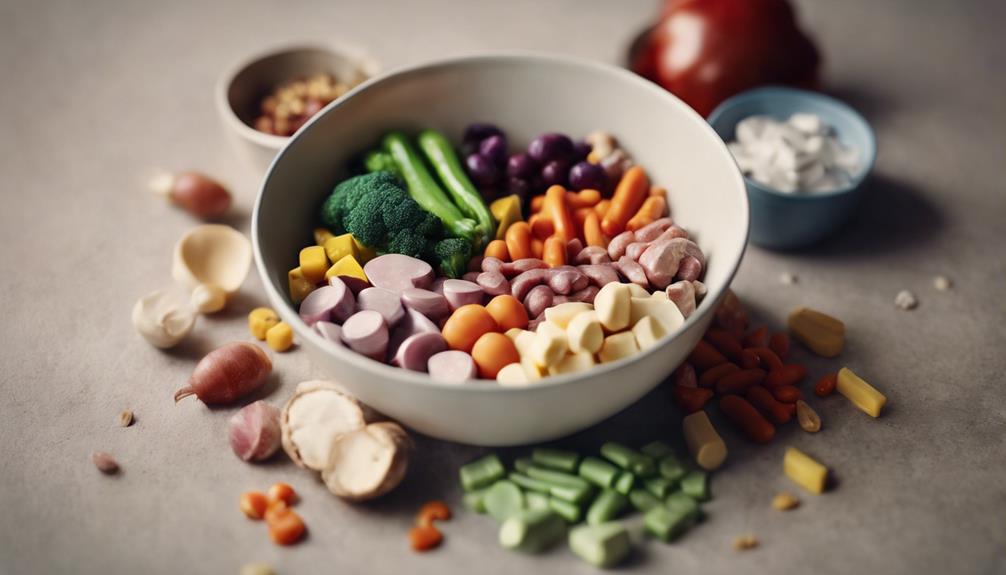
Incorporating essential nutrients into a ferret's diet is crucial for supporting digestive health and ensuring proper gastrointestinal function. To promote optimal digestive support in ferrets, it's essential to focus on specific nutrients such as:
- Protein Sources: Ferrets are obligate carnivores, meaning their diet should primarily consist of animal-based proteins. High-quality protein sources like meat, poultry, and eggs provide the necessary amino acids for digestive function and overall health.
- Vitamin Supplements: In addition to a balanced diet, ferrets may benefit from vitamin supplements to ensure they receive adequate amounts of essential nutrients. Vitamin E, for example, plays a crucial role in maintaining digestive health and supporting the immune system.
- Taurine: This amino acid is vital for ferrets' overall well-being, including digestive function. Taurine deficiency can lead to severe health issues, making it important to include taurine-rich foods or supplements in their diet for optimal digestive support.
Hydration for Digestive Function
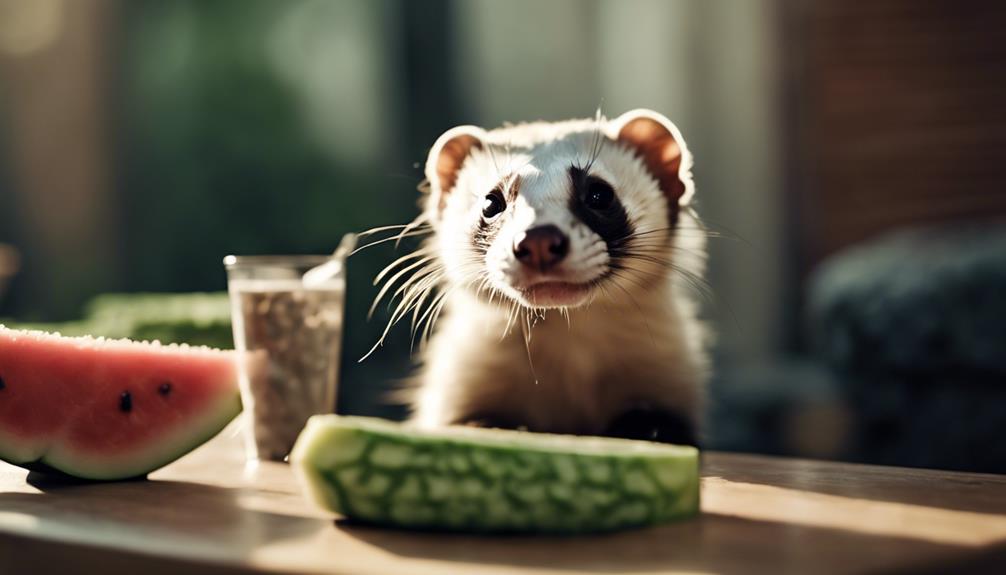
Ensuring adequate hydration is essential for maintaining optimal digestive function in ferrets. Hydration plays a crucial role in supporting the digestive system by helping transport nutrients, aiding in the breakdown of food, and promoting the secretion of digestive enzymes. Ferrets need access to clean, fresh water at all times to prevent dehydration, which can lead to digestive issues such as constipation or impaction.
Water is essential for the proper function of digestive enzymes in ferrets. These enzymes, such as amylase and lipase, are responsible for breaking down carbohydrates, proteins, and fats in the food ferrets consume. Without sufficient hydration, these enzymes may not function effectively, leading to improper digestion and potential health problems.
To ensure your ferret stays hydrated, provide a water bottle or bowl that's easily accessible and regularly check to ensure it's clean and filled. Monitoring your ferret's water intake is crucial, as changes may indicate an underlying health issue affecting their digestive system. By prioritizing hydration, you can support your ferret's digestive health and overall well-being.
Avoiding Harmful Additives in Diet

To ensure optimal digestive health for ferrets, it's crucial to steer clear of harmful additives commonly found in commercial diets. Understanding the overview of harmful additives, identifying potentially dangerous ingredients, and opting for safe alternatives are key steps in safeguarding a ferret's well-being and digestive system.
Harmful Additives Overview
When examining ferret dietary needs, it's crucial to be vigilant in identifying and avoiding harmful additives that could potentially compromise their digestive health. Ferrets are sensitive animals, and certain additives can disrupt their gastrointestinal balance, leading to digestive issues.
To ensure the well-being of these pets, it's essential to steer clear of harmful additives commonly found in commercial pet foods. Some harmful additives to watch out for include:
- Artificial colors and flavors: These additives can cause digestive upset and may lead to allergic reactions in ferrets.
- Preservatives like BHA and BHT: These chemicals have been linked to digestive disorders and other health issues in ferrets.
- High levels of sugar or carbohydrates: Excessive sugar and carbs can disrupt a ferret's digestive system and lead to obesity and other health problems.
Identifying Harmful Ingredients
Identifying harmful ingredients in a ferret's diet is crucial for maintaining their digestive health and overall well-being. When selecting ferret food, it's important to be aware of potential toxins and harmful preservatives that can negatively impact their health. Here are some common harmful ingredients to watch out for:
| Harmful Ingredients | Description | Effects |
|---|---|---|
| Artificial Colors | Synthetic dyes added for appeal | Linked to hyperactivity and allergies |
| Ethoxyquin | Preservative in some pet foods | Associated with liver damage |
| BHA/BHT | Synthetic antioxidants | Potential carcinogens |
Choosing Safe Alternatives
For optimal ferret digestive health, it's essential to select dietary additions that are free from harmful additives commonly found in commercial ferret food. Ensuring diet safety is crucial in providing the best nutrition for these furry companions. When choosing safe alternatives for your ferret's diet, consider the following:
- Avoid Artificial Preservatives: Opt for natural preservatives like Vitamin E (tocopherols) instead of artificial additives like BHA, BHT, or ethoxyquin.
- Check for Added Sugars: Look for products without added sugars or high-fructose corn syrup, as these can disrupt your ferret's digestive system.
- Opt for Whole Ingredients: Choose nutritional supplements made from whole, natural ingredients to provide essential nutrients without unnecessary fillers or additives.
Balancing Dietary Additions for Ferrets
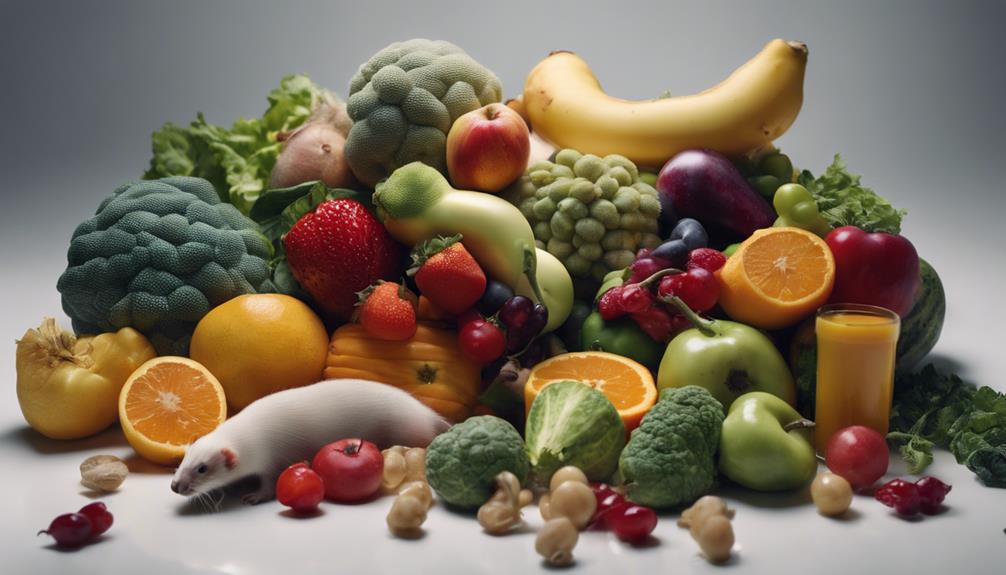
To ensure optimal digestive health in ferrets, it is essential to carefully balance the dietary additions they receive. Balancing dietary additions involves incorporating digestive enzymes and prebiotic foods to support the gastrointestinal system of ferrets. Digestive enzymes aid in the breakdown of nutrients, ensuring better absorption and utilization of food. Prebiotic foods contain fibers that promote the growth of beneficial gut bacteria, which can improve digestion and overall gut health in ferrets.
| Digestive Enzymes | Prebiotic Foods | Additional Recommendations |
|---|---|---|
| *Protease:* Helps break down proteins | *Inulin:* Stimulates the growth of beneficial bacteria | Regular veterinary check-ups to monitor digestive health |
| *Lipase:* Aids in fat digestion | *FOS:* Supports the growth of probiotics | Providing fresh water at all times |
| *Amylase:* Assists in carbohydrate breakdown | *Chicory Root:* Contains inulin for gut health | Ensuring a balanced diet with proper nutrients |
| *Bromelain:* Helps with protein digestion | *Barley:* Rich in beta-glucans for gut health | Monitoring ferret's weight and appetite |
| *Papain:* Aids in protein breakdown | *Flaxseed:* Contains fiber for digestive health | Providing mental stimulation and exercise opportunities |
Frequently Asked Questions
Can Ferrets Safely Consume Raw Vegetables and Fruits to Support Their Digestive Health?
Ferrets should not consume raw vegetables and fruits as their digestive system is designed for a high-protein diet. These foods can cause digestive issues. It is crucial to provide appropriate protein sources and cooked meats for their nutritional needs.
Are There Any Specific Foods or Supplements That Can Help Prevent Hairball Formation in Ferrets?
To help prevent hairball formation in ferrets, it's important to consider their grooming habits and fiber intake. Additionally, digestive enzymes and probiotic supplements can aid in digestion, reducing the risk of hairball complications.
How Can You Tell if a Ferret Is Experiencing Digestive Issues, and When Should You Seek Veterinary Care?
When a ferret shows signs of discomfort like decreased appetite or loose stools, it may indicate digestive issues. If these symptoms persist, a vet consultation is crucial. Interestingly, up to 90% of ferrets will experience gastrointestinal problems in their lifetime.
Are There Any Natural Remedies or Herbs That Can Help Improve a Ferret's Digestion?
Herbal remedies, probiotics, enzyme supplements, and digestive support can aid in improving a ferret's digestion. These additions can help maintain a healthy gut flora and support overall digestive health in ferrets.
Can Certain Dietary Additions Help Prevent Dental Issues in Ferrets, Which Can Impact Their Digestive Health?
Certain dietary additions like probiotic supplements and enzyme-rich snacks can aid in preventing dental issues in ferrets. Dental chews and high-fiber treats also play a role in maintaining good oral health, which can positively impact their digestive system.






